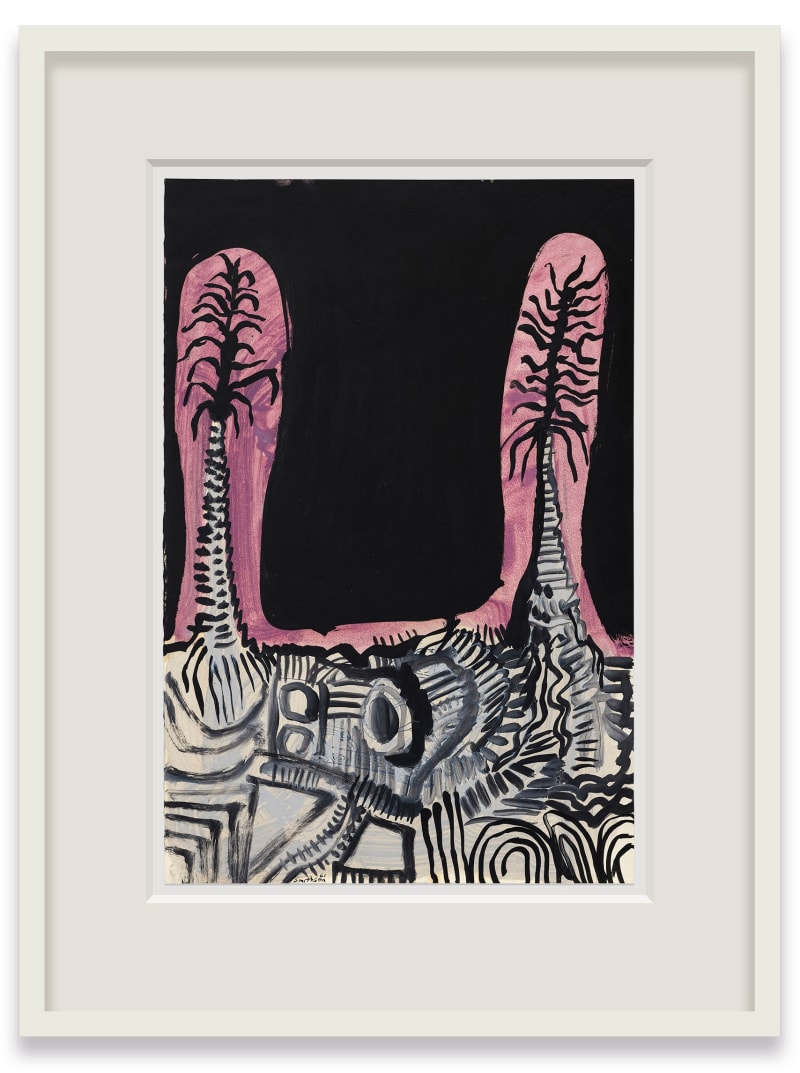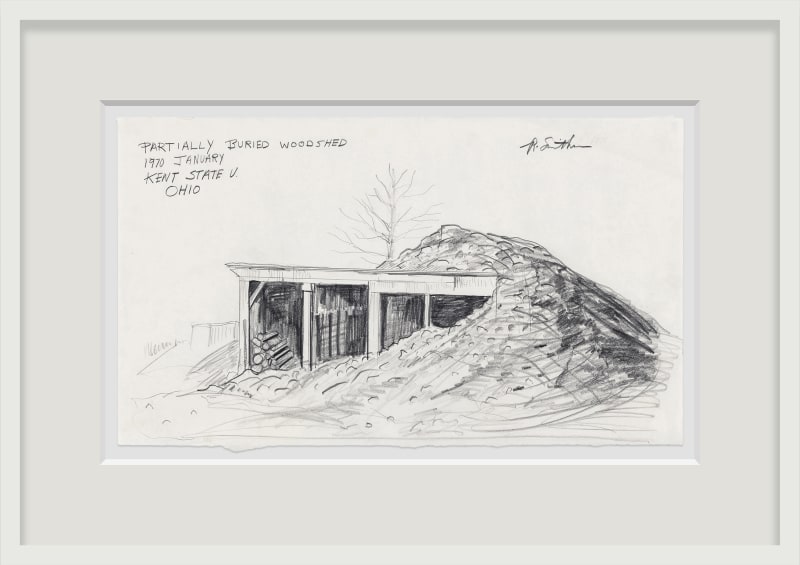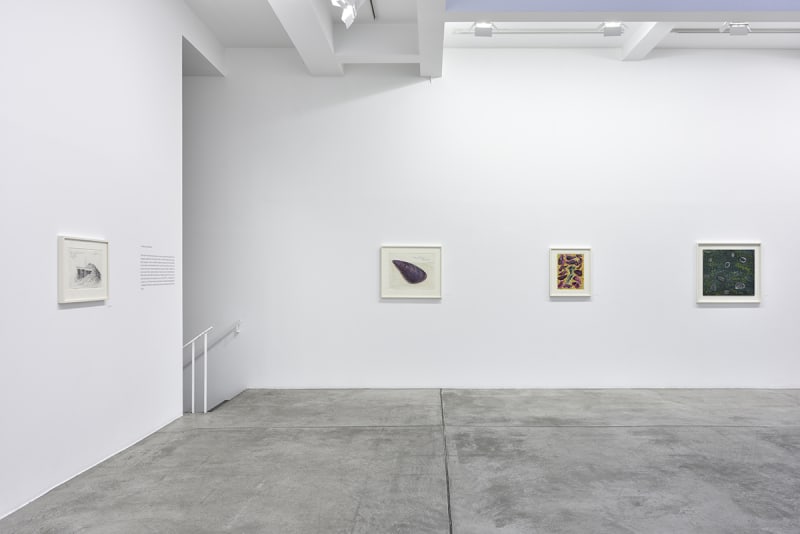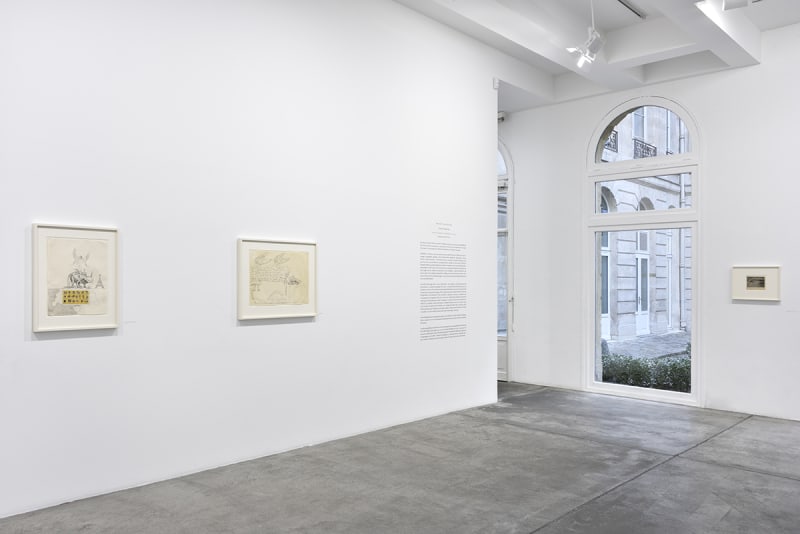Robert Smithson: Primordial Beginnings
Overview
Galerie Marian Goodman, Paris and Holt/Smithson Foundation are pleased to announce the first exhibition of Robert Smithson at the Gallery.
Born in Passaic, New Jersey, Robert Smithson (1938-73) recalibrated the possibilities of art. For over fifty years his work and ideas have influenced artists and thinkers, building the ground from which contemporary art has grown.
Primordial Beginnings will investigate Smithson’s exploration of, as he said in 1972, “origins and Primordial Beginnings , […] the archetypal nature of things.” This careful selection of works on paper demonstrates how Smithson worked as, to use his words, a geological agent. He presciently explored the impact of human beings of the surface of our planet. The earliest works are fantastical science fiction landscape paintings embedded in geological thinking. These rarely seen paintings from 1961 point to his later earthworks and proposals for collaborations with industry. Between 1961 and 1963 Smithson developed a series of collages showing evolving amphibians and dinosaurs. Paris in the Spring (1963) depicts a winged boy atop a Triceratops beside the Eiffel Tower, while Algae Algae (ca, 1961-63) combines paint and collage turtles in a dark green sea of words.
Galerie Marian Goodman, Paris and Holt/Smithson Foundation are pleased to announce the first exhibition of Robert Smithson at the Gallery.
Born in Passaic, New Jersey, Robert Smithson (1938-73) recalibrated the possibilities of art. For over fifty years his work and ideas have influenced artists and thinkers, building the ground from which contemporary art has grown.
Primordial Beginnings will investigate Smithson’s exploration of, as he said in 1972, “origins and Primordial Beginnings , […] the archetypal nature of things.” This careful selection of works on paper demonstrates how Smithson worked as, to use his words, a geological agent. He presciently explored the impact of human beings of the surface of our planet. The earliest works are fantastical science fiction landscape paintings embedded in geological thinking. These rarely seen paintings from 1961 point to his later earthworks and proposals for collaborations with industry. Between 1961 and 1963 Smithson developed a series of collages showing evolving amphibians and dinosaurs. Paris in the Spring (1963) depicts a winged boy atop a Triceratops beside the Eiffel Tower, while Algae Algae (ca, 1961-63) combines paint and collage turtles in a dark green sea of words.
For Smithson, landscape and its inhabitants were always undergoing change. In 1969 he started working with temporal sculptures made from gravitational flows and pours, thinking through these alluvial ideas in drawings. The first realized flow was Asphalt Rundown, in October 1969 in Rome, and the last, Partially Buried Woodshed, took place on the campus of Kent State University in Ohio. A selection of drawings related to these important event sculptures are on display in Primordial Beginnings. Smithson was invested in a definition of sculpture that was timebound and precarious, that would not claim monumental status, and would instead collaborate with entropy.
An autodidact, Smithson's interests in travel, cartography, geology, architectural ruins, prehistory, philosophy, science-fiction, popular culture, and language spiral through his work. In his short and prolific life, Smithson produced paintings, drawings, sculptures, architectural schemes, films, photographs, writings, earthworks, and all the stops between. From his landmark earthworks to his 'quasi-minimalist' sculptures, Nonsites, writings, proposals, collages, detailed drawings, and radical rethinking of landscape, Smithson's ideas are profoundly urgent for our times. By exploring the conceptual and physical boundaries of landscape Smithson raised questions about our place in the world, their relevance heightened as the dangers of global warming move ever closer.
Primordial Beginnings will be accompanied by a simultaneous exhibition, Hypothetical Islands, at Marian Goodman Gallery, London. Both exhibitions will feature rarely seen works from the personal collection of the artist Nancy Holt (1938-2014). Holt married Smithson in 1963 and managed his Estate between 1973 and 2014. Primordial Beginnings and Hypothetical Islands are organized in partnership with Holt/Smithson Foundation, an artist endowed foundation dedicated to continuing the creative legacies of Nancy Holt and Robert Smithson.
Notes:
About the exhibitions
Primordial Beginnings and Hypothetical Islands and are organized by Philipp Kaiser, Chief Executive Director of Artists and Programs at Marian Goodman Galleries, and Lisa Le Feuvre, Executive Director of Holt/Smithson Foundation. About Holt/Smithson Foundation and Marian Goodman Gallery In February 2020 Holt/Smithson Foundation and Marian Goodman Gallery announced their partnership. The partnership between Holt/Smithson Foundation and Marian Goodman Gallery marks a return. In 1965 Marian Goodman was a founder of Multiples, Inc., a landmark project publishing prints, multiples, and books by leading American artists -including Robert Smithson. An exhibition dedicated to Multiples, Inc. launches at Marian Goodman Gallery, New York in January 2021.
About Holt/Smithson Foundation
Active since 2018, Holt/Smithson Foundation exists to continue the creative and investigative spirit of the artists Nancy Holt (1938-2014) and Robert Smithson (1938-73). Holt and Smithson developed innovative ways of exploring our relationship with the planet, expanding the limits of artistic practice. Their Foundation engages in programs developing the artists’ creative legacies, continuing the transformation they brought to the world of art and ideas. Holt/Smithson Foundation works in partnership to produce exhibitions, publications, public programs, and new research. http://holtsmithsonfoundation.org
About Marian Goodman Gallery
For over forty years, Marian Goodman Gallery has played an important role in introducing European artists to American audiences and helping to establish a vital dialogue among artists and institutions working internationally. Marian Goodman Gallery was founded in New York City in late 1977. In 1995 the gallery expanded to include an exhibition space in Paris and in 2014 an exhibition space in London. In late 2016 she realized her dream of opening a bookstore and project space in Paris. https://www.mariangoodman.com About Robert Smithson Born in Passaic, New Jersey, Robert Smithson (January 2, 1938 – July 20, 1973), spent his formative years in New Jersey. In 1963 he married the artist Nancy Holt (1938–2014), who managed the Estate of Robert Smithson from 1973-2014, and who literally willed Holt/Smithson Foundation into being.
Smithson is best known for his earthworks Spiral Jetty (1970), Broken Circle/Spiral Hill (1971), and Amarillo Ramp (1973). Prior these earthworks Smithson created performative entropic land works, such as the ephemeral sculptures Asphalt Rundown (1969, Rome), Glue Pour (1969, Vancouver), Concrete Pour (1969, Chicago), and Partially Buried Woodshed (1970, Kent State) speak poignantly to issues of time and the human condition.
Smithson’s first solo exhibition, with emphasis on what he described as ‘expressionistic work’, took place in 1957 at Allan Brilliant’s gallery in New York. The artist’s peripatetic life took him to Rome in 1961, when George Lester offered him his first solo international exhibition at Galleria George Lester, where he explored quasi-religious subject matter. His early paintings, drawings and sculptures made between 1961 and 1963 were imbued with references to concrete poetry, popular culture, and science fiction. Influenced by minimalism, in 1964 Smithson declared his quasi-minimal sculptures made from industrial materials of metal and mirrored Plexiglas as his ‘mature’ works, distancing himself from his early expressionistic paintings and drawings.
Smithson’s writings on art, western culture, graphic texts, and interviews, are published in The Writings of Robert Smithson, edited by Nancy Holt (1979, New York University Press, with an expanded version edited by Jack Flam published in 1998). His works are in numerous museum collections, including the Art Institute of Chicago, Dia Art Foundation, Museum of Modern Art New York, National Museum of Modern Art Tokyo, Solomon R. Guggenheim Museum, and Whitney Museum of American Art.
For further information, please contact Xaver von Mentzingen at xaver@mariangoodman.com or +33 1 48 04 70 52. For all press enquiries, please contact Rosanna Hawkins at Rees & Co on rosanna@reesandco.com or +44 (0)7910 092 634.














![Robert Smithson Glue [Vancouver], 1969](https://artlogic-res.cloudinary.com/w_800,c_limit,f_auto,fl_lossy,q_auto/artlogicstorage/mariangoodman/images/view/2cf74d2617a18bbb8ad62af7d9562bf0j.jpg)
















